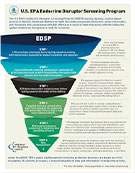March 23, 2015
European trade bodies criticise Endocrine Society Research
Claims by the Endocrine Society that the effects of endocrine disrupting chemicals are costing Europe €157bn/year are “highly speculative, say trade bodies representing the pesticides and chemicals industries (CW 9 March 2015).
The society – a professional medical organisation – said chemicals such as phthalates, bisphenol A, pesticides and flame retardants, contributed to causing conditions and diseases such as autism, childhood obesity, adult diabetes, testicular cancer and attention deficit hyperactivity disorder (ADHD).
“The estimated human health costs are based on an assumption of chemicals contributing to endocrine-related diseases, which is not supported by the weight of currently available scientific evidence,” a spokesman for the European Crop Protection Association (Ecpa) told Chemical Watch.
The study authors did not apply a weight-of-evidence approach to the epidemiological evidence used in their underlying assumptions, said the spokesman, failing, for example, to include studies which found no link between pesticides and neuro-behavioural effects. Nor, he said, is the connection between the two supported by an expert report on pesticides and health commissioned by the European Food Safety Authority (Efsa) in 2013.
“Overall, considering the unbalanced and questionable scientific basis upon which the reports are based, the estimated costs of the human diseases should be viewed as highly speculative and treated with caution,” he said.
The European Chemical Industry Council (Cefic) agrees, saying the Endocrine Society studies do not provide any new evidence about the EDC effects and assume that these effects exist. “In short,” it says, “they are an attempt to estimate the costs of an assumed effect.”
“We can all engage in informed speculation, but it is for the competent regulatory authorities to undertake an objective and independent evaluation of all the available evidence, and to judge whether and in what circumstance substances can be used safely,” Cefic added.



